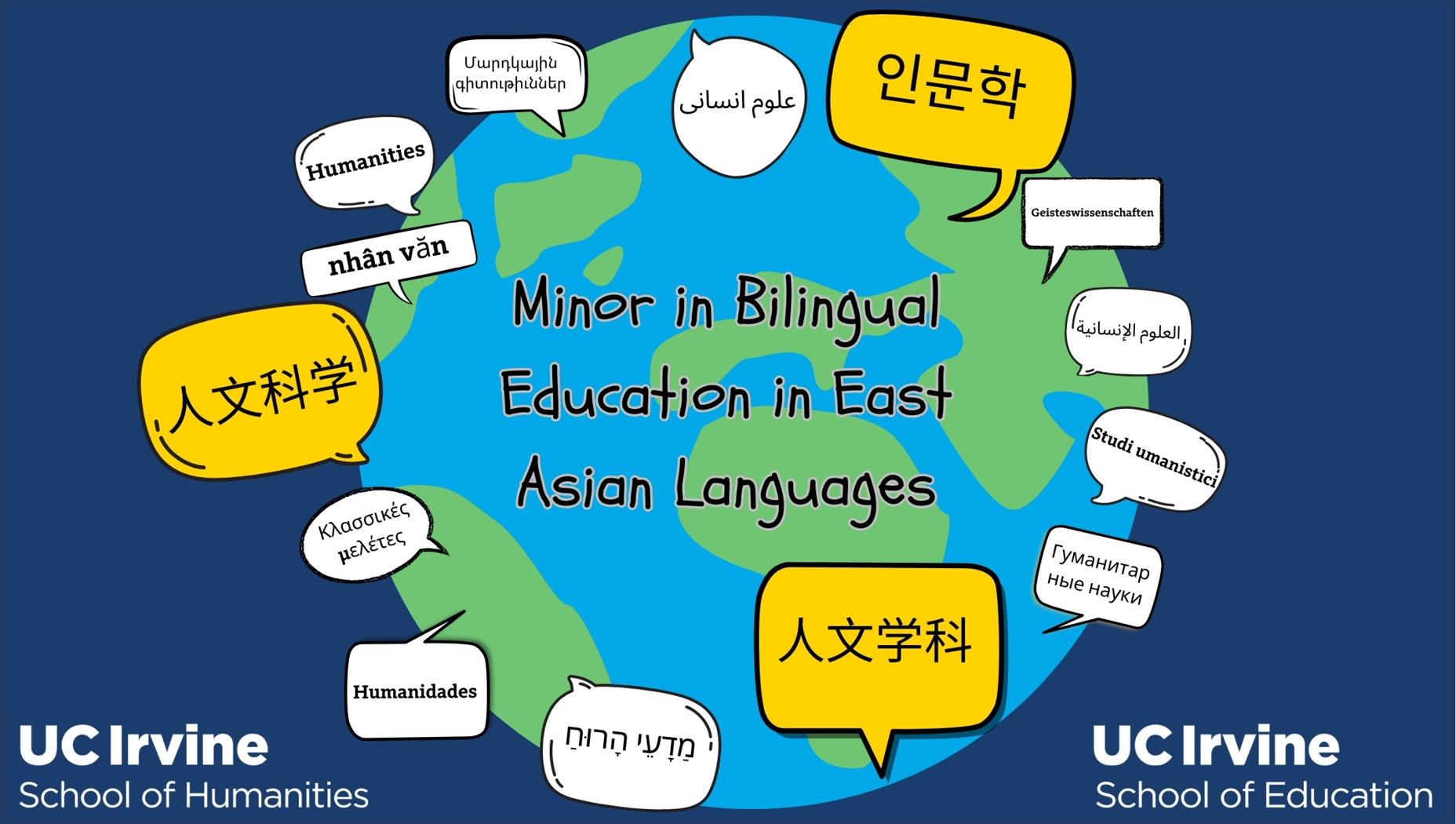
By Nikki Babri
UC Irvine is at the forefront of preparing students for a multilingual future. In response to the surging demand for bilingual education, particularly in Chinese, Japanese and Korean, the School of Humanities and the School of Education have collaborated to launch a new Minor in Bilingual Education in East Asian Languages.
Cultivating linguistic diversity

“Our unique opportunity lies in the fact that UCI is an Asian American and Native American Pacific Islander-Serving Institution (AANAPISI), with about half of our undergraduate student population having Asian heritage,” explains Professor and former Chair of East Asian Studies Hu Ying. “This minor helps students turn their personal interests in East Asian languages into viable career paths.”
The minor’s development was led by Young-Suk Kim during her tenure as Senior Associate Dean of the School of Education, in close collaboration with Professor Ying and the Department of East Asian Studies.
Long desiring to enhance students’ career readiness, the Department of East Asian Studies initiated conversations with the School of Business and the School of Education in 2019, leading to the launch of the “Professional Chinese” course series targeted toward students in business, education and other public-facing career paths.
Building on this goal and UCI’s existing commitment to bilingual education, the new Minor in Bilingual Education in East Asian Languages was developed. This program expands on the Minor in Spanish/English Bilingual Education, which was established in 2021 through a partnership between the School of Humanities and the School of Education. Unlike the Minor in Spanish-English Bilingual Education which resides in the School of Humanities, this new program is housed within the School of Education.
The minor has already garnered significant student interest. A survey conducted in March 2023 found that of 218 students polled, an overwhelming 91% expressed interest in the proposed minor. This enthusiasm reflects the changing demographics and linguistic needs of California, where over 6 million Asian Americans make up 15.5% of the state’s population, and more than 1.3 million K-12 students are English Language Learners.
Students will complete 16 units of core education courses, followed by a 12-unit track in Japanese, Korean or Chinese, depending on their target language. This structure allows students to gain a solid foundation in educational theory while honing their language skills. The program also includes courses on East Asian studies to ensure students develop a deep understanding of the cultural contexts in which these languages are used.
Instructors utilize a range of technologically innovative approaches, including AI, contemporary video content, language-specific apps and flipped classrooms. The pedagogical goal is to ensure students master both language skills and effective teaching strategies, preparing them for the evolving landscape of bilingual education in the modern world.
Expanding career horizons

The program’s focus on multilingualism reflects a broader shift in societal attitudes. “While there was once a prevalent belief that proficiency in English alone was crucial for achieving success and the American Dream, our globalized world has shifted this perspective,” Professor Kim asserts. “Today, multilingualism is not only common but highly valued. Research consistently demonstrates the manifold benefits of being multilingual, including cognitive advantages, enriched cultural understanding and substantial economic opportunities.”
This perspective is echoed by Jerry Won Lee, professor of English and director of the Program in Global Languages and Cultures, who notes a growing trend in heritage language maintenance. While research shows that language proficiency often diminishes by the second or third generation due to earlier generations prioritizing assimilation, he’s observed a renewed interest among current students in preserving their heritage languages.

Lee, who also directs the International Center for Writing and Translation, emphasizes the program’s broad applicability. “Even if students are not interested in going into teaching, the skills gained are highly applicable and transferable to various industries. Bilingual proficiency is always an advantage in today’s job market, and this minor provides students with a formal credential, offering tangible proof of their linguistic qualifications to potential employers.”
The minor opens up a wide array of career opportunities for graduates as they gain a better understanding of diverse communities, develop language and communication skills and enhance their multicultural competency. Graduates may find opportunities as bilingual teachers, interpreters, translators or cultural liaisons. Beyond education, the skills learned are also valuable in fields like social work, healthcare and international relations.
The future of bilingual education
The minor is just the beginning of a larger vision for bilingual education at UCI. “Once this minor is fully established in 3-5 years, we plan to incorporate a practicum-internship program to the degree where students will gain hands-on experience in the classrooms of local Asian bilingual K-12 schools,” Ying reveals.
She anticipates the minor’s growth into a major program, driven by the increasing demand for bilingual educators as more K-12 schools across the country integrate Asian languages into their curricula. As the program evolves, it may expand to include more languages and specialized courses like “Professional Japanese” and “Professional Korean.”
Kim sees the collaboration between the School of Education and the Department of East Asian Cultures as a springboard for expanding academic and community engagement at UCI. “Our interdisciplinary partnership is poised to go beyond language programs, fostering a deeper integration of cultural studies, pedagogy and community outreach. This could involve community partnerships, internships and programs and collaborative projects that connect students with local schools and organizations serving Asian American communities,” she explains.
The ultimate goal, Kim emphasizes, is to celebrate and promote linguistic diversity while equipping students with the skills and knowledge crucial for success in a global society.

Dean of the School of Education Frances Contreras shares, “The UCI School of Education recognizes the critical importance of this partnership with the School of Humanities to launch the Minor in Bilingual Education in Asian Languages. Given our university designation as an AANAPISI, academic programs that respond to the needs of the broader academic community are critical to our campus and the field.
"This program also represents commitment to ensuring that language and linguistic diversity is positioned as an asset for our students as they enter a global economy and engage with diverse communities in their respective fields of study.”
Interested in reading more from the School of Humanities? Sign up for our monthly newsletter.
